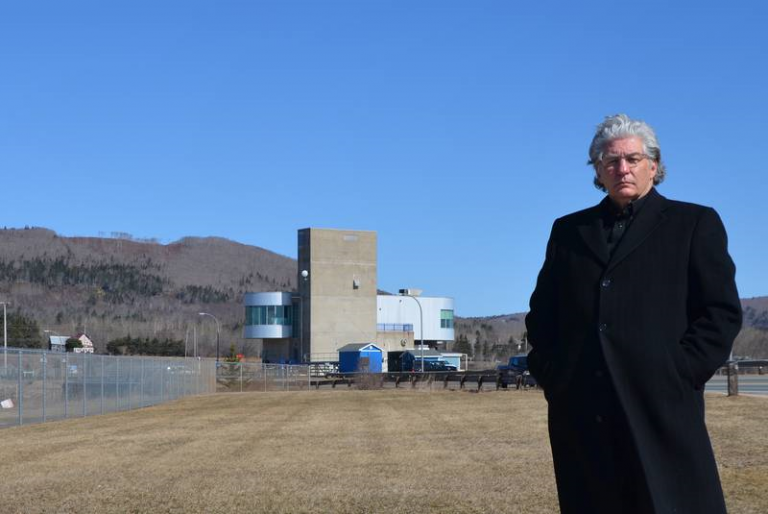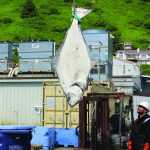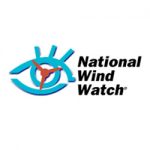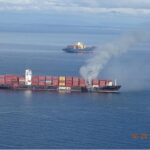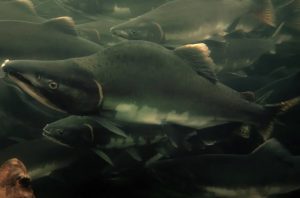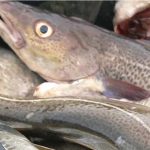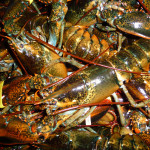Monthly Archives: August 2017
Kings off limits starting Thursday: ADF&G cites low chinook salmon stocks coastwide
 The Alaska Department of Fish and Game on Thursday will shut down commercial and salt-water sport chinook salmon fishing throughout Southeast Alaska. “Extreme management measures” are needed to protect kings originating from Southeast Alaska, Northern British Columbia, the Fraser River of British Columbia and the coast of Washington state, according to an announcement made late Monday by Fish and Game. The region wide commercial and sport chinook closures are effective 12:01 a.m. Thursday and will last at least through Sept. 30, according to the department. “We didn’t miss fish,” Fish and Game Deputy Commissioner Charles Swanton said late Monday of fishing efforts in the region. “The fish just aren’t there.” click here to read the story 14:30
The Alaska Department of Fish and Game on Thursday will shut down commercial and salt-water sport chinook salmon fishing throughout Southeast Alaska. “Extreme management measures” are needed to protect kings originating from Southeast Alaska, Northern British Columbia, the Fraser River of British Columbia and the coast of Washington state, according to an announcement made late Monday by Fish and Game. The region wide commercial and sport chinook closures are effective 12:01 a.m. Thursday and will last at least through Sept. 30, according to the department. “We didn’t miss fish,” Fish and Game Deputy Commissioner Charles Swanton said late Monday of fishing efforts in the region. “The fish just aren’t there.” click here to read the story 14:30
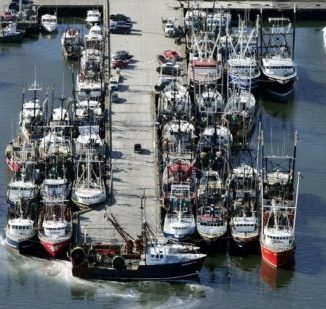
Don Cuddy: Port of New Bedford needs more dredging if it’s going to grow
It remains hugely frustrating that no one at the state level seems to recognize just how important this port is. When the Seastreak ferry recently broke down, it had to tie up at the State Pier for repairs. This in turn displaced the Voyager, a 130-foot fishing vessel, which had to move to Leonard’s Wharf, where boats are already moored five-deep. “We need updated infrastructure. When you have a 130-foot boat tied to a pier designed for 70-80 foot boats your infrastructure isn’t going to last long,” Ed Anthes-Washburn, the affable executive director of the Harbor Development Commission, told me as we toured the working waterfront in a HDC launch last week. “We also need to activate the rest of our waterfront.” click here to read the story 13:01
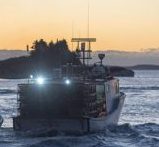
Canadian lobster in the pink thanks to European trade deal
The Comprehensive European Trade Agreement (CETA), soon to be implemented, will give a significant boost to Canada’s harvesters over those from Maine. Europeans will pay for Canadian lobsters tariff-free, while they pay a surcharge to Americans. Once freight and shrinkage fees are calculated in, lobsters can get expensive, so the CETA could make a significant difference to the prices charged for Canadian lobster in the European Union. Europe imported more than $150 million in lobster from the United States last year, slightly less than what they imported from Canada.,, CETA, however, could also benefit Americans since they send a good portion of their lobster catch to Canada for processing. Americans can rely on Canadian-based processing to increase sales by passing through Canada. click here to read the story 12:06
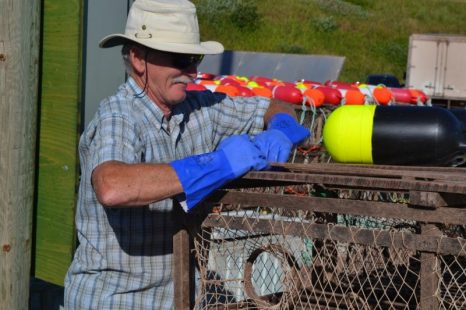
Brian Locke’s marking setting day milestone, 100th season-opening
When Brian Locke sets sail Tuesday morning from Howard’s Cove with Captain Jimmy Reilly, it will be his 100th time participating in the lobster fishing industry’s setting day tradition. Locke, 64, got his start in the industry in 1971 as second man with Mick Gallant. They set from Arsenault’s Wharf in Cascumpec, out through Goose Harbour to the north side lobster fishing grounds. He crewed for Howard’s Cove fisherman Allen Cooke. From 1973 to the early 2000’s, with the exception of three years in the early 1980s, he fished full or part fall seasons out of Howard’s Cove with a series of Cookes, mostly with his uncle Cyril and his cousin Ricky. click here to read the story 11:40
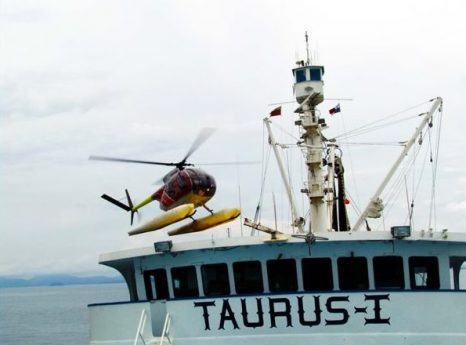
Let’s Go Fishing – Tuna Boat Ops
Since tuna is such a popular food worldwide and commands a high price, the use of expensive helicopters is cost effective for commercial tuna boats that use large nets called purse seines. Helicopters are extremely useful for spotting tuna, since these fish gather in large schools or shoals to cooperatively hunt vast areas for smaller fish prey. Helicopters takeoff early in the morning and fly long hours before parking on the ship overnight. R-22, R-44, B206, and MD500 are the most commonly used helicopters for this type of fishing. It’s not unusual for pilots with relatively few hours of flying time to join tuna operations. These jobs allow pilots to accumulate hours quickly, earn a decent paycheck, and work with fishing crew members from around the world while visiting exotic ports of call. click here to read the story 11:04
Pacific bluefin tuna not considered engangered
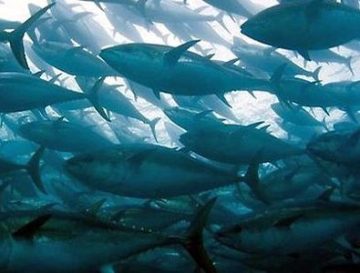 The National Oceanic and Atmospheric Administration Fisheries branch has determined that Pacific bluefin tuna are not endangered and do not need protection under the federal Endangered Species Act. The determination was announced Monday by Chris Yates, assistant regional administrator for protected resources, NOAA Fisheries West Coast Region, in response to a petition from activists and environmental groups across the nation asking the Trump administration to list Pacific bluefin tuna as endangered.,, A scientific review team found that the population is large enough to avoid the risks associated with a small population, such as a year with low survival, and that Pacific bluefin has recovered from similarly low levels in the past. click here to read the story 09:17
The National Oceanic and Atmospheric Administration Fisheries branch has determined that Pacific bluefin tuna are not endangered and do not need protection under the federal Endangered Species Act. The determination was announced Monday by Chris Yates, assistant regional administrator for protected resources, NOAA Fisheries West Coast Region, in response to a petition from activists and environmental groups across the nation asking the Trump administration to list Pacific bluefin tuna as endangered.,, A scientific review team found that the population is large enough to avoid the risks associated with a small population, such as a year with low survival, and that Pacific bluefin has recovered from similarly low levels in the past. click here to read the story 09:17
American Backlash Against Big Wind: States Cut Subsidies & Ban New Wind Power Projects
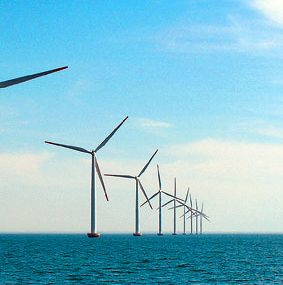 If your understanding of the world is limited to what’s printed in the mainstream press, you’d be forgiven for thinking that rural folk can’t wait to nuzzle up to 300 tonne Vestas, with 70m blades towering 180m above them.,, To be sure, you won’t read about this in the New York Times.,, The backlash is happening offshore, too. In New York, the Long Island Commercial Fishing Association and a boatload of fishermen and fishmongers have filed a federal lawsuit to prevent a wind project from being built on top of one of best squid and scallop fisheries on the Eastern Seaboard.,, As Bonnie Brady, the fiery executive director of the Long Island Commercial Fishing Association told me recently, “Destroying one environment in the name of trying to protect another environment makes no sense at all.” click here to read the story 08:53
If your understanding of the world is limited to what’s printed in the mainstream press, you’d be forgiven for thinking that rural folk can’t wait to nuzzle up to 300 tonne Vestas, with 70m blades towering 180m above them.,, To be sure, you won’t read about this in the New York Times.,, The backlash is happening offshore, too. In New York, the Long Island Commercial Fishing Association and a boatload of fishermen and fishmongers have filed a federal lawsuit to prevent a wind project from being built on top of one of best squid and scallop fisheries on the Eastern Seaboard.,, As Bonnie Brady, the fiery executive director of the Long Island Commercial Fishing Association told me recently, “Destroying one environment in the name of trying to protect another environment makes no sense at all.” click here to read the story 08:53
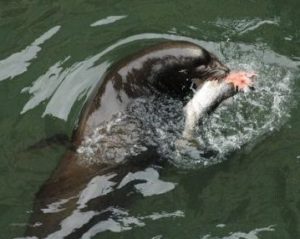
Report: Sea lions push Willamette River steelhead to brink of extinction
State wildlife officials say wild steelhead in the upper Willamette Basin could go extinct in coming years because of sea lions feasting on the iconic fish at Willamette Falls. The Statesman Journal reported in June that wild steelhead numbers hit all-time lows this year due to poor ocean conditions, historic drought and the long-term effects of habitat loss. But in an explosive report made public Monday, officials say sea lion predation could tip the scales toward extinction in rivers including the Santiam, Molalla and Calapooia, all Willamette tributaries. “We’ve reached the point where, unless we take some action, we may condemn this run to extinction,” said Dr. Shaun Clements, senior scientist and fish policy advisor for the Oregon Department of Fish and Wildlife. “We need to act now or extinction may be our legacy.” Video, click here to read the story 21:33
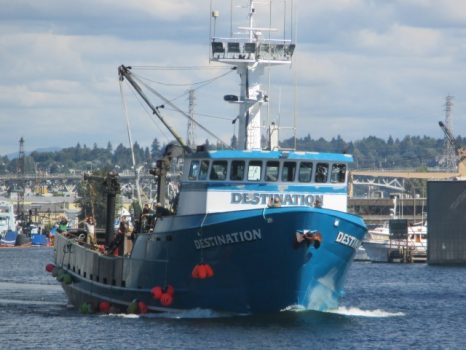
F/V Destination – Day 1: Investigation Hearing begins
In Seattle on Monday, the Coast Guard and the National Transportation Safety Board began two weeks of testimony into the sinking. Monday was spent questioning the ship’s owner, 68-year-old David Wilson. The experienced fisherman, who hired Captain Jeff Hathaway back in 1993, recounted documents recapping the safety drills and briefings given to all crew before the season began. Larry O’Grady, Raymond Vincler, Darrik Seibold, Charles Jones and Kai Hamik were all on board with Hathaway. All presumed lost. Earlier this summer, the U.S. Coast Guard icebreaker Healy spent days over the wreck and found the vessel sitting upright in 240 feet of water listing to the port. On Monday morning, Wilson was asked about maintenance issues — including a discussion, he had with the ship’s captain by phone while in Alaska. click here to read the story Todays proceedings can be reviewed click here, and the hearing restart at 09:00 tomorrow, using that link. 20:06
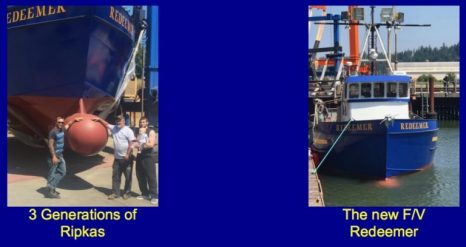
Toledo Boat Yard keeps crankin’ ’em out…
From Port of Toledo: Fishing Vessel Redeemer recently had a lot of work done on her at the Toledo Boat Yard – worked that was capped off with the traditional “re-Christening” of the vessel with a bottle of bubbly. The Port of Toledo’s crew celebrated with the F/V Redeemer’s owner, crew, family, and friends as the newly rebuilt vessel was launched. The boat is owned by Gary Ripka and recently featured in the Deadliest Catch: Dungeon Cove. The Redeemer fishes black cod, tuna, crab, and is set up to bottom fish. Video, click here to read the story 19:09
Yes, no, maybe
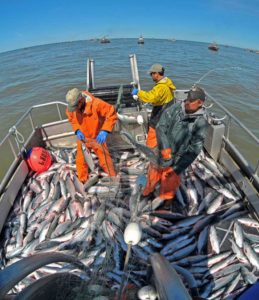 Only days after over-seeing the deaths of nearly 90,000 Upper Cook Inlet coho salmon in two commercial drift gillnet openings in the belief the coho run was late and strong, fishery managers with the Alaska Department of Fish and Game have changed their minds. An emergency order issued Sunday cut commercial fishing time in the northern Inlet in half and restricted drift netters to drift “Area 1” south of Kalgin Island, along with a corridor near the mouth of the Kenai River. The Area 1 restriction pushes the fleet down into the wide, unconstricted part of the Inlet where it is harder to find the fish. click here to read the story 16:57
Only days after over-seeing the deaths of nearly 90,000 Upper Cook Inlet coho salmon in two commercial drift gillnet openings in the belief the coho run was late and strong, fishery managers with the Alaska Department of Fish and Game have changed their minds. An emergency order issued Sunday cut commercial fishing time in the northern Inlet in half and restricted drift netters to drift “Area 1” south of Kalgin Island, along with a corridor near the mouth of the Kenai River. The Area 1 restriction pushes the fleet down into the wide, unconstricted part of the Inlet where it is harder to find the fish. click here to read the story 16:57
FISH-NL reiterates call for province to lift ban on outside fish buyers
 The Federation of Independent Sea Harvesters of Newfoundland and Labrador (FISH-NL) is reiterating its call for the provincial government to lift all restrictions and allow out-of-province buyers into the provincial market place for all species. “The commercial fishery for northern cod reopened on Newfoundland’s northeast coast on Aug. 1st, but very few harvesters are at it because there are no buyers,” says Ryan Cleary, President of FISH-NL.,, “Some fishermen are salting their cod with no idea of what they’ll eventually get for it — just like in my grandfather’s day,” says Richard Gillett. Vice-President of FISH-NL. “How far we’ve come.” click here to read the press release 16:11
The Federation of Independent Sea Harvesters of Newfoundland and Labrador (FISH-NL) is reiterating its call for the provincial government to lift all restrictions and allow out-of-province buyers into the provincial market place for all species. “The commercial fishery for northern cod reopened on Newfoundland’s northeast coast on Aug. 1st, but very few harvesters are at it because there are no buyers,” says Ryan Cleary, President of FISH-NL.,, “Some fishermen are salting their cod with no idea of what they’ll eventually get for it — just like in my grandfather’s day,” says Richard Gillett. Vice-President of FISH-NL. “How far we’ve come.” click here to read the press release 16:11
Labrador Fishermen’s Union Shrimp Company to process Northern Peninsula cod
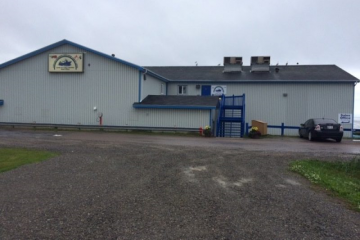 On Sunday, Aug. 6, the Labrador Fishermen’s Union Shrimp Company Ltd. (LFUSC) reached a preliminary agreement with the Fish, Food and Allied Workers (FFAW-Unifor) union and St. Anthony Seafoods Inc. to purchase and process cod caught in NAFO Division 3K. The three groups met, with a number of fishermen attending, at the Hotel North in St. Anthony. Under the preliminary agreement, harvesters will unload the cod in Goose Cove and St. Lunaire-Griquet, and it will then be shipped by truck to St. Barbe. There, it will be transported across the Strait of Belle Isle by ferry, to be processed at the LFUSC plant in L’Anse au Loup. click here to read the story 14:29
On Sunday, Aug. 6, the Labrador Fishermen’s Union Shrimp Company Ltd. (LFUSC) reached a preliminary agreement with the Fish, Food and Allied Workers (FFAW-Unifor) union and St. Anthony Seafoods Inc. to purchase and process cod caught in NAFO Division 3K. The three groups met, with a number of fishermen attending, at the Hotel North in St. Anthony. Under the preliminary agreement, harvesters will unload the cod in Goose Cove and St. Lunaire-Griquet, and it will then be shipped by truck to St. Barbe. There, it will be transported across the Strait of Belle Isle by ferry, to be processed at the LFUSC plant in L’Anse au Loup. click here to read the story 14:29
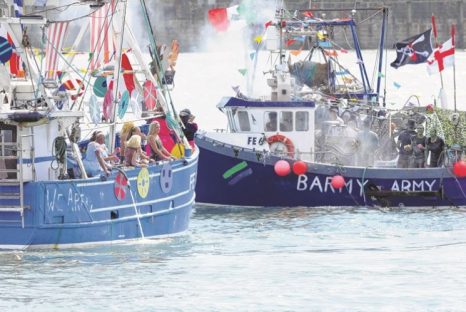
Folkestone Trawler Race 2017 details as fishermen prepare for events
Trawler Race weekend is almost upon us again as Folkestone’s fishing quarter prepares for its two biggest days in the year. A new addition is coming to the festival on Saturday and Sunday which is expected to be watched by thousands of people from The Stade and the Harbour Arm – as the town celebrates its fishing heritage. The trawlers will set off for the historic race on Saturday with entertainment starting from midday and the race getting under way at 2pm. click here to read the story 13:40
Mid-Atlantic Fishery Management Council meeting August 8 – 10, 2017 in Philadelphia, PA
 The public is invited to attend the Mid-Atlantic Fishery Management Council’s August 2017 meeting to be held August 8-10, 2017 in Philadelphia, PA. The meeting will be held at the Courtyard Marriott, 21 N. Juniper St., Philadelphia, PA 19107, Telephone 215-496-3200. Briefing Materials & Agenda Overview Agenda click here Attend Meeting with Adobe Connect Click here Listen Live! www.mafmc.org 12:12
The public is invited to attend the Mid-Atlantic Fishery Management Council’s August 2017 meeting to be held August 8-10, 2017 in Philadelphia, PA. The meeting will be held at the Courtyard Marriott, 21 N. Juniper St., Philadelphia, PA 19107, Telephone 215-496-3200. Briefing Materials & Agenda Overview Agenda click here Attend Meeting with Adobe Connect Click here Listen Live! www.mafmc.org 12:12
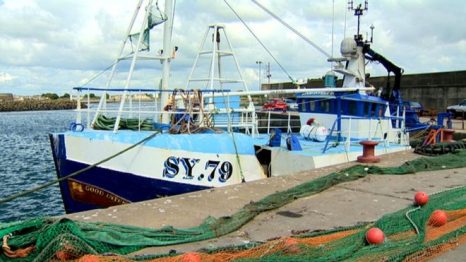
Ardglass trawler skipper fined over collision
An Ardglass trawler skipper has been fined more than £2,000 after his boat collided with another vessel off the County Down coast in July 2015. Paul Thomas Wills of Russell Place, Ardglass, admitted not keeping a proper lookout on his fishing boat the Silver Dee when it collided with another trawler, the Good Intent. The Silver Dee sank in less than 10 minutes as a result of the collision. Its crew transferred onto the Good Intent. click here to read the story 11:08
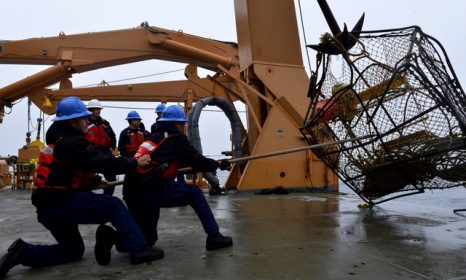
F/V Destination – Hearings to begin on why Seattle-based crab boat sank with 6-man crew aboard
Two weeks of Coast Guard hearings into the sinking of the Seattle-based Destination begin Monday. They will put a spotlight on safety in the crab-boat fleet, and are expected to include testimony about the recent exploration of the sunken vessel by a remotely operated vehicle. The Destination sits on the bottom of the Bering Sea, listing heavily to its port side and still carrying roughly a third of the steel-framed pots the six-man crew planned to use in a winter crab harvest off Alaska. In two weeks of Seattle hearings that begin Monday, Coast Guard officers will hear testimony from the owner of the crab boat, former crew and other industry and government officials as they gather clues to what went so horribly wrong when the crew perished Feb. 11. click here to read the story to read the USCG notice click here with instructions for comment. click here for live stream of the proceedings. 09:29
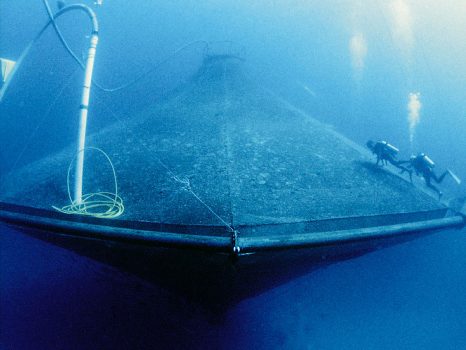
Offshore Aquaculture: Groups divided over Gulf fish farming
While proponents of aquaculture support expanding fish and shellfish farming in the Gulf of Mexico, local fishermen and food safety groups are wary of the consequences. “Developing offshore aquaculture in the Gulf of Mexico will benefit everyone. Consumers will get additional access to sustainable domestically grown seafood,” said Jim Gossen, president of the Gulf Seafood Foundation. “Using the latest proven management practices, this should provide more wild fish to both the recreational and commercial fisheries.” In 2016, NOAA filed a final rule implementing the nation’s first comprehensive regulatory program for aquaculture in federal waters. The rule allowed for the establishment of a regional permitting process to manage the development of an environmentally sound and economically sustainable aquaculture industry in the Gulf. However, local and national groups oppose the current plan in its entirety or how it’s being implemented. click here to read the story 08:56
As eels grow in value, US government clamps down on poaching
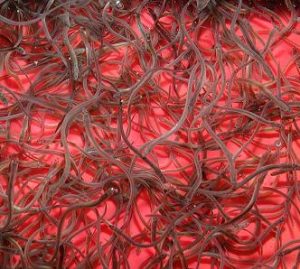 Law enforcement authorities have launched a crackdown on unlicensed eel fishermen and illicit sales along the East Coast.,, In Maine, more than 400 licensed fishermen make their living fishing for elvers in rivers such as the Penobscot in Brewer and the Passagassawakeag in Belfast every spring. They say law enforcement is vital to protecting the eels and the volatile industry. Randy Bushey, of Steuben, has been fishing for elvers since 1993. He said he saw his income balloon from as little as $5,000 per year in the 1990s to more than $350,000 in 2012. He said tighter quotas mean he’s earning less these days, and in the most recent season he made about $57,000. “I’ve seen the best, and I’ve seen the worst,” Steuben said. “I want to see it preserved. I want to see it straightened out.” click here to read the story 08:16
Law enforcement authorities have launched a crackdown on unlicensed eel fishermen and illicit sales along the East Coast.,, In Maine, more than 400 licensed fishermen make their living fishing for elvers in rivers such as the Penobscot in Brewer and the Passagassawakeag in Belfast every spring. They say law enforcement is vital to protecting the eels and the volatile industry. Randy Bushey, of Steuben, has been fishing for elvers since 1993. He said he saw his income balloon from as little as $5,000 per year in the 1990s to more than $350,000 in 2012. He said tighter quotas mean he’s earning less these days, and in the most recent season he made about $57,000. “I’ve seen the best, and I’ve seen the worst,” Steuben said. “I want to see it preserved. I want to see it straightened out.” click here to read the story 08:16
Rape allegation against division manager reveals ‘highly sexualized’ culture at state agency
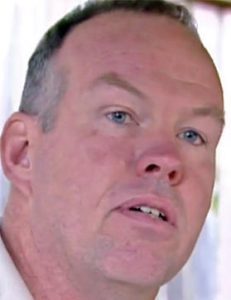 An inappropriate sexual culture festered for more than a year within the upper ranks of the state Department of Fish and Wildlife until a rape allegation against a former division manager brought it to light. A law firm hired by Fish and Wildlife to investigate claims of sexual harassment spawned after the alleged rape found that a group of workers in the agency’s upper echelon often held or tolerated sexually explicit conversations at work. Some engaged in other inappropriate behavior both on the clock and after hours. The firm, MFR Law Group, also reported that the behavior, including at least one case of workplace sexual harassment, largely went unreported and unaddressed by the agency’s top leaders. click here to read the story 17:04
An inappropriate sexual culture festered for more than a year within the upper ranks of the state Department of Fish and Wildlife until a rape allegation against a former division manager brought it to light. A law firm hired by Fish and Wildlife to investigate claims of sexual harassment spawned after the alleged rape found that a group of workers in the agency’s upper echelon often held or tolerated sexually explicit conversations at work. Some engaged in other inappropriate behavior both on the clock and after hours. The firm, MFR Law Group, also reported that the behavior, including at least one case of workplace sexual harassment, largely went unreported and unaddressed by the agency’s top leaders. click here to read the story 17:04
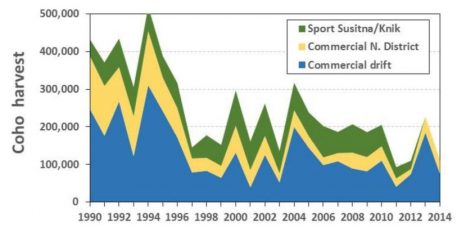
Where are the coho?
The bad news came in triplicate for Little Susitna River guide Andy Couch on Friday. First there was the daily coho salmon enumeration from the Little Su weir. The 39 fish counted the day before brought the season’s total to 679, the lowest count since 2012. August 2012 started with the Alaska Department of Fish and Game announcing that bait fishing – scheduled to open Aug. 6 – would not be allowed. Four days later came the announcement the river would be closed to coho fishing for the rest of the year. When Couch, a longtime Little Su angler and guide saw the Thursday count this year, he knew what to expect next: another bait ban. But before that was announced the commercial catch statistics for a Thursday opening of the Cook Inlet drift gillnet fleet started trickling in. Fish Politics. click here to read the story 15:49
Gulf of Mexico Fishery Management Council meeting in San Antonio, Tx. August 7 – 10, 2017
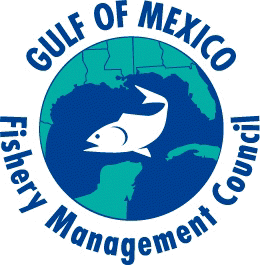 The Gulf of Mexico Fishery Management Council will meet at the Marriott Plaza, San Antonio, located at 555 S. Alamo St. San Antonio, Texas. The meeting will convene on the following days and local times: Council Committees meet 10:30 – 5:00 on Monday. Council Committees meet 8:30 – 5:00 on Tuesday. Council Committees meet 8:30 – 10:30 on Wednesday. Full Council meets 10:45 – 5:30 on Wednesday. Full Council meets 8:30 – 3:45 on Thursday Read the Committee and Council Agenda, Click here Register to listen live click here www.gulfcouncil.org 13:59
The Gulf of Mexico Fishery Management Council will meet at the Marriott Plaza, San Antonio, located at 555 S. Alamo St. San Antonio, Texas. The meeting will convene on the following days and local times: Council Committees meet 10:30 – 5:00 on Monday. Council Committees meet 8:30 – 5:00 on Tuesday. Council Committees meet 8:30 – 10:30 on Wednesday. Full Council meets 10:45 – 5:30 on Wednesday. Full Council meets 8:30 – 3:45 on Thursday Read the Committee and Council Agenda, Click here Register to listen live click here www.gulfcouncil.org 13:59
Re-examining safety practices in the wake of this year’s commercial fishing deaths
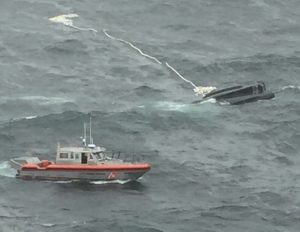 “It’s time for a checkup from the neck up” — meaning an industry time-out to evaluate fishing operations and behaviors — advises Jerry Dzugan, director of the Sitka-based Alaska Marine Safety Education Association for over 30 years. Dzugan was speaking in response to the 11 fishing deaths that have occurred in Alaska so far this year. It’s the most in 13 years and follows a 76 percent decrease in commercial fishing fatalities since the 1980s. “The causes are still capsizing, sinkings, swampings and man overboards (MOBs). They haven’t changed much,” Dzugan said. “People need to step back and focus on the basics, such as making sure your vessel is stable and watertight, and that your crew is protected from man overboards.” click here to read the story 11:37
“It’s time for a checkup from the neck up” — meaning an industry time-out to evaluate fishing operations and behaviors — advises Jerry Dzugan, director of the Sitka-based Alaska Marine Safety Education Association for over 30 years. Dzugan was speaking in response to the 11 fishing deaths that have occurred in Alaska so far this year. It’s the most in 13 years and follows a 76 percent decrease in commercial fishing fatalities since the 1980s. “The causes are still capsizing, sinkings, swampings and man overboards (MOBs). They haven’t changed much,” Dzugan said. “People need to step back and focus on the basics, such as making sure your vessel is stable and watertight, and that your crew is protected from man overboards.” click here to read the story 11:37
Our View: Federal fishery decision undermines management
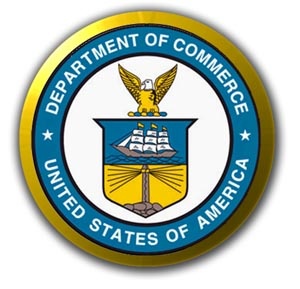 Years of measured, responsible attempts to improve the effectiveness of the Magnuson-Stevens Fishery Conservation and Management Act in these dynamic and troubled waters are challenged by a new threat: the secretary of Commerce, the next to last stop (before the president himself) in the chain of command for fishery management. Commerce Secretary Wilbur Ross, known as the “King of Bankruptcy” for his investment strategy, overruled at the end of July a decision by the Atlantic States Marine Fisheries Commission, potentially undermining the cooperative management of near-shore fisheries of the 15 coastal states from Maine to Florida. click here to read the op-ed 09:38
Years of measured, responsible attempts to improve the effectiveness of the Magnuson-Stevens Fishery Conservation and Management Act in these dynamic and troubled waters are challenged by a new threat: the secretary of Commerce, the next to last stop (before the president himself) in the chain of command for fishery management. Commerce Secretary Wilbur Ross, known as the “King of Bankruptcy” for his investment strategy, overruled at the end of July a decision by the Atlantic States Marine Fisheries Commission, potentially undermining the cooperative management of near-shore fisheries of the 15 coastal states from Maine to Florida. click here to read the op-ed 09:38
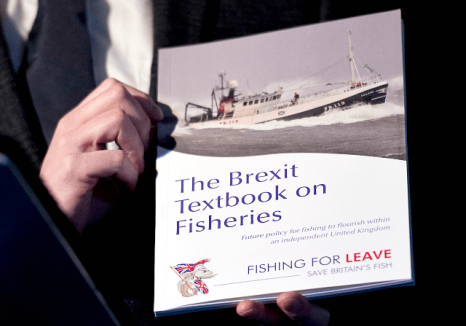
Brexit Betrayal: EU Boats ‘Will Still be able to Catch Large Amounts of Fish in British Waters’, Says Gove
Leave campaigner and Secretary of State for the Environment, Food and Rural Affairs Michael Gove has shocked the British fishing industry by walking back a pledge to end the exploitation of Britain’s waters by EU vessels, saying they “will still be able to catch large amounts of fish” on a visit to Denmark. “Danish fishermen will still be able to catch large amounts of fish in British waters, even if the British leave the EU. Britain has no fish cutters [those employed to clean, trim and bone fish] and production facilities enough to catch all the fish in British waters,” he said. Video, click here to read the story 09:16
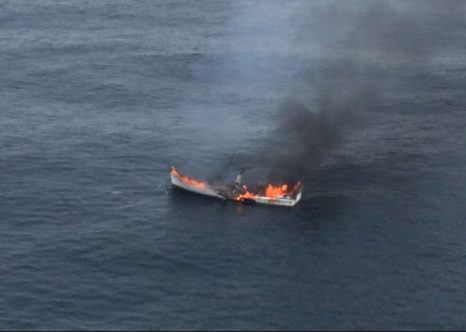
Coast Guard rescues two fishermen in distress near Coos Bay, Ore.
The Coast Guard rescued two fishermen after their vessel was engulfed in flames 20 miles west of the Cape Blanco light near Coos Bay, Oregon, Saturday. A Coast Guard Station Chetco River 47-foot Motor Life Boat crew met the fishermen, who had abandoned the 47-foot fishing vessel Beverly B into a life raft, and transported them and their raft to port in Brookings, Oregon. Sector North Bend watchstanders received the report of the fishermen in distress from Station Coos Bay, who were notified by a volunteer light keeper at the Cape Blanco light, stating that a fishing vessel was on fire. Watchstanders directed the launch of Sector North Bend MH-65 Dolphin helicopter crew, who arrived on scene to find the fishermen in their life raft, and lowered a rescue swimmer to assess the situation. The 47-foot MLB crew arrived on scene shortly thereafter. The vessel was reported to be completely engulfed in flames and partially submerged -USCG- 22:38
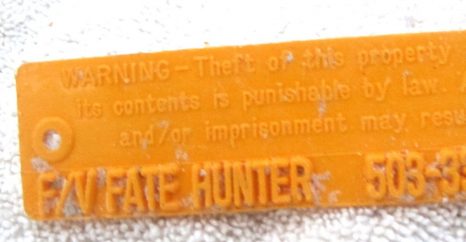
How a father’s shipwreck launched a message across an ocean to his grieving daughter
A chain of ocean currents that connects Alaska’s Prince William Sound to a beach on Hawaii’s Big Island delivered a piece of a 3-year-old shipwreck to a grieving family. The improbable voyage of a plastic fishing gear identification tag also had human help in the person of Alaska engineer Andy Baker, whose curiosity and diligence completed the connection. An expert on floating debris called Baker’s successful investigation “a very remote chance.” “It really is a very difficult thing to do,” oceanographer Curt Ebbesmeyer said. “It takes a lot of luck, a lot of effort and a lot of time. One thing out of a thousand is traceable. That tag you are writing about is a remarkable bit of serendipity.” In this case, the luck connected a father to his daughter after his death. click here to read the story Four posts about F/V Fate Hunter from 2013 click here to review 14:02
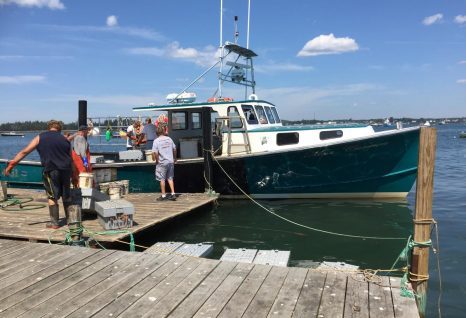
Maine Lobstering Union Pursuing Higher Profits
Maine lobstermen have long been known as a fiercely independent lot. But some are looking to the power of unity, in the form of a statewide, catch-to-table co-op. The goal is to harvest a larger and more predictable share of the profits. It’s 10 a.m. and Rock Alley has already been cruising Washington County’s Sequin’s Passage off Beals Island since a little after daybreak. The 60-year-old Jonesport fishermen tells his two stern men to get ready as he maneuvers his 46-foot, Jarvis Newman lobster boat through some shallow waters to get to his traps.,, Lobsters from the MLU are transported by union truck drivers to the Lamoine holding pound, where union employees sort, crate and eventually load them onto even larger trucks, also driven by union workers. click here to read the story 12:39
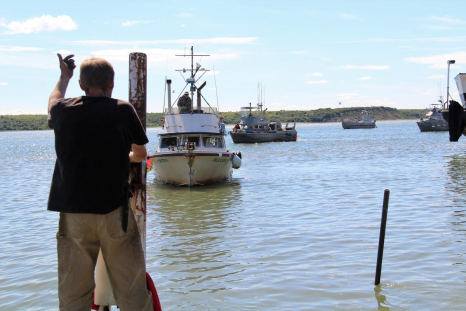
Post-salmon season: A boat haul out ride along
It is 2 p.m. and Carl Williams is behind the tractor wheel, hauling a boat out of water. He has not slept in 48 hours. He said he has to work with the tides to pull boats out, and when the tides are out there are repairs to take care of. “It’s just something that’s gotta get done,” he said. “Don’t have time for coffee. Just something that has to get done. Tide doesn’t wait for anybody, just have to keep going.” There are about 1,500 drift gill net boats in Bristol Bay, and 600 of those are hauled in and out of water by Carl. He owns and operates the business Anchor Inn Boat Storage in Naknek. He is in the last push of the season hauling boats out of water. Audio, click here to read the story 10:51
Book Review: I got caught by Caught
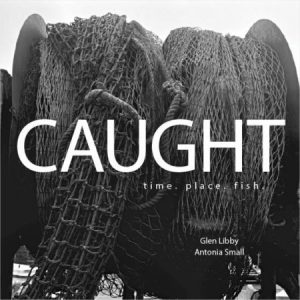 From Tony Small’s first photo and Glen Libby’s first quote, I was hooked by their wonderful book: Caught – Time. Place. Fish. “Changing the world was not as simple as it seemed here in Port Clyde, but a remarkable thing happened…” That’s the first thing I read, and it was so true: this is the story of a truly remarkable achievement in Port Clyde, Maine, one of my favorite places. As Port Clyde’s fishing industry declined, due to the disappearance of shrimp and other species, Glen jumped up and organized the first Community Supported Fishery (CSF) in the nation. The CSF was designed to process and sell the fish and allow fishermen to capture more of the profits. It was not an immediate success. click here to read the story 09:38
From Tony Small’s first photo and Glen Libby’s first quote, I was hooked by their wonderful book: Caught – Time. Place. Fish. “Changing the world was not as simple as it seemed here in Port Clyde, but a remarkable thing happened…” That’s the first thing I read, and it was so true: this is the story of a truly remarkable achievement in Port Clyde, Maine, one of my favorite places. As Port Clyde’s fishing industry declined, due to the disappearance of shrimp and other species, Glen jumped up and organized the first Community Supported Fishery (CSF) in the nation. The CSF was designed to process and sell the fish and allow fishermen to capture more of the profits. It was not an immediate success. click here to read the story 09:38

































